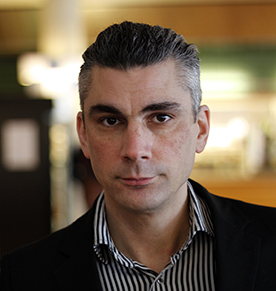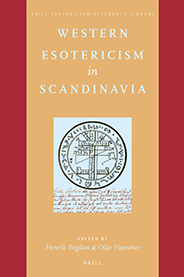- Home
- News and events
- Find news
- New book on esotericism in Scandinavia
New book on esotericism in Scandinavia
How have ideas and movements such as alchemy, magic, Satanism, astrology, Freemasonry and witchcraft influenced our culture and society? Henrik Bogdan works as a professor of religious studies at the University of Gothenburg and is also the editor of a new book titled Western Esotericism in Scandinavia.
The book is the first encyclopaedic work on Western esotericism in Scandinavia and covers the period from the 16th century to the present.
– W estern esotericism is an umbrella term that encompasses a wide range of currents and movements, from alchemy, magic and astrology to Freemasonry and Rosicrucianism, modern witchcraft, UFO movements and more – the concept is enormously diverse. Somewhat simplified, what these groups have in common is that they fall somewhere in between science and religion, says Henrik Bogdan.
estern esotericism is an umbrella term that encompasses a wide range of currents and movements, from alchemy, magic and astrology to Freemasonry and Rosicrucianism, modern witchcraft, UFO movements and more – the concept is enormously diverse. Somewhat simplified, what these groups have in common is that they fall somewhere in between science and religion, says Henrik Bogdan.
Surveying Scandinavia
Bogdan co-edited the new book with Professor Olav Hammer from the University of Southern Denmark. The two professors started discussing the project when Dictionary of Gnosis and Western Esotericism – a similar book focusing on central Europe – was published in 2005.
– The research on Western esotericism in the Nordic countries has been very limited and does not fall within the realms of a single discipline. Instead it is scattered across a number of different subject areas, and by piecing together all the fragments and presenting it as coherent subject, we give the reader a good view of the phenomenon in our part of the world.
Esoteric movements have influenced our culture
According to Bogdan, the academic community has had a simplified understanding of esotericism, for example by treating the movements as a reaction against the Enlightenment. The new book challenges this view – the esoteric movements were in fact often part of the Enlightenment.
– We see the same thing when we look at more modern phenomena, from the 19th century onward: they are in many cases perfectly in line with and not reactions against modern society or the trend of secularisation. They have often had a strong impact on Nordic culture – remember that many leading intellectuals were deeply interested in occult subjects, like Swedish writer August Strindberg.
Scholars from several areas
T he book took eight years to complete, is about 700 pages long and consists of 80 articles written by 47 scholars from different areas: history of ideas and science, comparative literature, religious studies and history. It points to many similarities between the developments in continental Europe and Scandinavia.
he book took eight years to complete, is about 700 pages long and consists of 80 articles written by 47 scholars from different areas: history of ideas and science, comparative literature, religious studies and history. It points to many similarities between the developments in continental Europe and Scandinavia.
– The common notion that the Nordic countries have been a bit isolated from the rest of the world turns out to be incorrect. For example, several well-known alchemists visited Scandinavia and many Nordic intellectuals got their training and education in central Europe. We can also see that this was something that was studied at the highest levels of society. For example, in both Denmark and Sweden, Freemasonry was closely linked to the royal families in the 1700s. And the oldest and most distinguished noble families were often heavily involved in these things, in contrast to other countries where the movements were not as widely accepted.
Writes about Freemasonry, Satanism and magic
Bogdan also authored three chapters of the book, one on Freemasonry in Sweden, one on Satanism in Sweden and – together with history-of-ideas scholar Kjell Lekeby – one on magic in Sweden in the early modern period. He thinks that anybody with an interest in the development of modern Nordic culture may find the book worth reading.
– We often think of religion and esotericism as something outside our shared society, as something very private. But the book shows that it has a central place in Western culture, that it is expressed in many different ways and that it has had a strong impact also in the Nordic countries, says Professor Bogdan.
First book in a series
Western Esotericism in Scandinavia is the first book in a series published by Brill Academic Publishers. Similar encyclopaedic works on esotericism in for example the Mediterranean region, Eastern Europe and the US are in the pipeline.
More information:
Henrik Bogdan, tel. +46 (0)31 786 4557 or +46 (0)708 34 6926, email henrik.bogdan@lir.gu.se
Photo: Thomas Melin